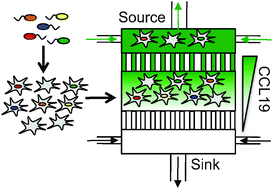A microfluidic-based genetic screen to identify microbial virulence factors that inhibit dendritic cell migration†
Abstract
Microbial pathogens are able to modulate host cells and evade the immune system by multiple mechanisms. For example, Salmonella injects effector proteins into host cells and evades the host immune system in part by inhibiting dendritic cell (DC) migration. The identification of microbial factors that modulate normal host functions should lead to the development of new classes of therapeutics that target these pathways. Current screening methods to identify either host or pathogen genes involved in modulating migration towards a chemical signal are limited because they do not employ stable, precisely controlled chemical gradients. Here, we develop a positive selection microfluidic-based genetic screen that allows us to identify Salmonella virulence factors that manipulate DC migration within stable, linear chemokine gradients. Our screen identified 7 Salmonella effectors (SseF, SifA, SspH2, SlrP, PipB2, SpiC and SseI) that inhibit DC chemotaxis toward CCL19. This method is widely applicable for identifying novel microbial factors that influence normal host cell chemotaxis as well as revealing new mammalian genes involved in directed cell migration.


 Please wait while we load your content...
Please wait while we load your content...